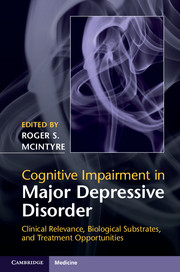 Cognitive Impairment in Major Depressive Disorder
Cognitive Impairment in Major Depressive Disorder Book contents
- Cognitive Impairment in Major Depressive DisorderClinical Relevance, Biological Substrates, and Treatment Opportunities
- Cognitive Impairment in Major Depressive Disorder
- Copyright page
- Contents
- Figures
- Tables
- Contributors
- Preface
- Abbreviations
- Part I Clinical relevance of cognitive dysfunction in major depressive disorder
- Part II Underlying biological substrates associated with cognitive dysfunction in major depressive disorder
- Part III Evaluating cognitive dysfunction in major depressive disorder
- Part IV Treatment opportunities for ameliorating cognitive dysfunction in major depressive disorder
- 18 Neuroscience of functional outcomes and treatment targets in major depressive disorder
- 19 Treatment of cognitive dysfunction in adults with major depressive disorder
- 20 A novel treatment targeting cognitive dysfunction in mood disorders
- 21 Cognitive remediation for major depressive disorder
- 22 Exercise and cognition
- Index
- References
21 - Cognitive remediation for major depressive disorder
from Part IV - Treatment opportunities for ameliorating cognitive dysfunction in major depressive disorder
Published online by Cambridge University Press: 05 March 2016
- Cognitive Impairment in Major Depressive DisorderClinical Relevance, Biological Substrates, and Treatment Opportunities
- Cognitive Impairment in Major Depressive Disorder
- Copyright page
- Contents
- Figures
- Tables
- Contributors
- Preface
- Abbreviations
- Part I Clinical relevance of cognitive dysfunction in major depressive disorder
- Part II Underlying biological substrates associated with cognitive dysfunction in major depressive disorder
- Part III Evaluating cognitive dysfunction in major depressive disorder
- Part IV Treatment opportunities for ameliorating cognitive dysfunction in major depressive disorder
- 18 Neuroscience of functional outcomes and treatment targets in major depressive disorder
- 19 Treatment of cognitive dysfunction in adults with major depressive disorder
- 20 A novel treatment targeting cognitive dysfunction in mood disorders
- 21 Cognitive remediation for major depressive disorder
- 22 Exercise and cognition
- Index
- References
- Type
- Chapter
- Information
- Cognitive Impairment in Major Depressive DisorderClinical Relevance, Biological Substrates, and Treatment Opportunities, pp. 306 - 320Publisher: Cambridge University PressPrint publication year: 2016
References
- 1
- Cited by
